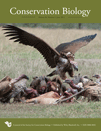
CONSERVATION BIOLOGY
metrics 2024
Empowering conservation through rigorous scientific discourse.
Introduction
CONSERVATION BIOLOGY, published by Wiley, is a leading journal in the field of ecology and conservation, with a focus on disseminating high-quality research that addresses pressing environmental challenges. With a strong impact factor and categorized in the top quartile (Q1) across various relevant fields including Ecology, Evolution, Behavior and Systematics, and Nature and Landscape Conservation, the journal plays a pivotal role in advancing the scientific understanding of biodiversity and conservation practices. Since its establishment in 1987, CONSERVATION BIOLOGY has provided a vital platform for researchers, professionals, and students to share innovative findings and facilitate discussions surrounding ecological sustainability and conservation strategies. Although it is not an open-access publication, it ensures that a wide range of significant research is accessible to the global scientific community. The journal’s rigorous peer-review process and reputation for excellence make it an essential resource for anyone involved in the study of ecology and conservation.
Metrics 2024
 2.17
2.17 5.20
5.20 6.10
6.10 249
249Metrics History
Rank 2024
Scopus
IF (Web Of Science)
JCI (Web Of Science)
Quartile History
Similar Journals
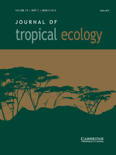
JOURNAL OF TROPICAL ECOLOGY
Connecting Researchers to the Heart of Tropical BiodiversityThe JOURNAL OF TROPICAL ECOLOGY, published by Cambridge University Press, serves as a pivotal platform for advancing knowledge in the field of ecology, particularly within tropical environments. With an ISSN of 0266-4674 and an E-ISSN of 1469-7831, this esteemed journal has been a key resource since its inception in 1985, maintaining a focus on empirical research that addresses the complexities of tropical ecosystems. It holds a respectable Q3 ranking in the Ecology, Evolution, Behavior and Systematics category as of 2023, indicating its significant contribution to the field, although it remains within the competitive mid-range. The journal publishes original research, reviews, and methodological articles that illuminate the rich biodiversity and unique ecological processes of tropical regions, fostering a deeper understanding of conservation challenges. Accessible from the United Kingdom, this publication appeals to a diverse audience of researchers, professionals, and students keen on exploring ecological dynamics in tropical settings, and plays a crucial role in promoting scientific discourse and collaborative efforts aimed at preserving our planet's vital ecosystems.

Neotropical Biology and Conservation
Fostering Dialogue for a Greener TomorrowNeotropical Biology and Conservation, published by Pensoft Publishers, serves as a pivotal platform for researchers and professionals dedicated to the understanding and preservation of biodiversity in the Neotropical region. This Open Access journal, operational since 2006 and based in Brazil, invites contributions that delve into the complexities of ecology, evolution, and conservation strategies pertinent to the diverse ecosystems of South and Central America. With a commendable 2023 impact factor reflected in its Q3 rankings across multiple categories including Animal Science, Ecology, and Plant Science, it stands as a valuable resource for academics seeking to publish innovative findings and foster dialogue in these critical areas of study. The journal's commitment to open access ensures that knowledge is readily available to anyone interested in advancing the field of neotropical biology and conservation. Join the global conversation and contribute to the vital work of preserving our planet’s rich biological heritage through rigorous research published in this esteemed journal.

Journal of Asia-Pacific Biodiversity
Illuminating the path to biodiversity conservation and sustainability.Journal of Asia-Pacific Biodiversity is an esteemed academic journal dedicated to advancing knowledge in the dynamic fields of biodiversity, ecology, and related biological sciences. Published by the NATL SCIENCE MUSEUM & KOREAN NATL ARBORETUM, this journal serves as a crucial platform for researchers and professionals seeking to explore and disseminate impactful findings pertaining to the Asia-Pacific region's rich biological diversity. With an E-ISSN of 2287-9544, the journal is indexed in leading databases, achieving a Q3 ranking across various categories in 2023, including Animal Science and Zoology, Ecology, Insect Science, and Plant Science. It strives to unite scientific research across disciplines, thus fostering a deeper understanding of ecological dynamics and conservation efforts within this vital region. The journal operates with an open access policy, ensuring that findings are widely available for widespread benefit, making it an essential resource for students, researchers, and environmental practitioners alike. Since its initiation in 2013 and continuing through 2024, the journal remains committed to delivering high-quality, peer-reviewed articles that contribute significantly to the global conversation on biodiversity and ecosystem sustainability.
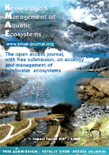
Knowledge and Management of Aquatic Ecosystems
Bridging Research and Conservation for Aquatic FuturesKnowledge and Management of Aquatic Ecosystems, published by EDP SCIENCES S A, is a premier open-access journal dedicated to the interdisciplinary study of aquatic ecosystems. With an ISSN of 1961-9502 and an impressive history since 1928, this journal serves as a vital resource for researchers and professionals in the fields of Ecology, Aquatic Science, Water Science and Technology, and Nature Conservation. The journal has consistently achieved high rankings, including a Q2 classification in multiple categories, which underscores its significant contribution to the evolving landscape of aquatic research. With access options that promote widespread dissemination of knowledge, Knowledge and Management of Aquatic Ecosystems aims to bridge gaps in research, policy, and practical applications, making it an invaluable asset for students, researchers, and policymakers aiming for impactful solutions in aquatic management and conservation.

Insect Conservation and Diversity
Transforming Conservation Strategies Through ResearchInsect Conservation and Diversity is an esteemed academic journal dedicated to the field of insect science, published by WILEY in the United Kingdom. With its ISSN 1752-458X and E-ISSN 1752-4598, this journal serves as a vital resource for researchers and professionals striving to advance knowledge in biodiversity and conservation. The journal holds an impressive Q1 ranking in both Ecology, Evolution, Behavior and Systematics and Insect Science as of 2023, which reflects its rigorous peer-review process and significant contributions to the field. Recognized for its high-quality publications, Insect Conservation and Diversity ranks 9th out of 181 in insect science and 72nd out of 721 in ecology within Scopus, placing it in the top tiers of academic journals. Researchers are encouraged to submit their work from 2009 to 2024, enhancing our understanding of insect biodiversity and conservation strategies. Aimed at fostering advancements in knowledge and collaborative efforts, this journal is essential for all those committed to the study and preservation of insect diversity.
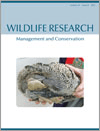
WILDLIFE RESEARCH
Innovative Research Driving Biodiversity SolutionsWILDLIFE RESEARCH is a leading journal dedicated to the rigorous study of wildlife ecology and management, published by CSIRO PUBLISHING in Australia. With a notable ISSN of 1035-3712 and an E-ISSN of 1448-5494, this prestigious journal has been at the forefront of advancing knowledge in the fields of ecology, evolution, behavior, and systems since its inception in 1974. Spanning over four decades, WILDLIFE RESEARCH has established itself as a Q1 journal in Ecology, Evolution, Behavior and Systematics and Q2 in Management, Monitoring, Policy and Law as of 2023, indicating its substantial impact and relevance in these critical areas. It ranks impressively in Scopus, with scores in the 72nd and 58th percentiles respectively for its categories, reflecting its commitment to high-quality research. The journal does not offer open access options, but it provides valuable insights for researchers, professionals, and students aiming to contribute to wildlife conservation and management practices. As it approaches its 50th year, WILDLIFE RESEARCH continues to play an essential role in shaping the discourse around environmental science, policy, and biodiversity conservation in the global landscape.
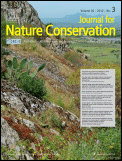
JOURNAL FOR NATURE CONSERVATION
Advancing the Science of ConservationJOURNAL FOR NATURE CONSERVATION, published by Elsevier GmbH, serves as a pivotal platform for the dissemination of applied and theoretical research in the fields of ecology, nature, and landscape conservation. With an ISSN of 1617-1381 and an E-ISSN of 1618-1093, this esteemed journal has earned a notable reputation, ranking in the Q2 category for both Ecology and Nature and Landscape Conservation in 2023. It is indexed in Scopus with commendable rankings, including #67/211 in Environmental Science - Nature and Landscape Conservation, highlighting its significance within the academic community. The journal’s diverse scope captures the complexities of environmental challenges and offers insights beneficial to researchers, conservationists, and policymakers dedicated to preserving biodiversity and facilitating sustainable practices. Situated in Munich, Germany, the journal has continuously contributed valuable knowledge since its inception in 1991, making it an essential resource for those committed to advancing conservation efforts on a global scale.

Conservation Letters
Transforming Insights into Action for Nature's FutureConservation Letters, published by Wiley, is a premier peer-reviewed journal dedicated to advancing the field of conservation science. As an Open Access journal since 2015, it provides researchers, practitioners, and policymakers with immediate access to cutting-edge research and insights that shape effective conservation strategies globally. With an impressive impact factor and a distinguished standing in the academic community—ranking in the Q1 category in disciplines such as Ecology, Evolution, and Nature Conservation—the journal plays a vital role in disseminating high-quality research that informs environmental practices. Based in the United States, it encompasses a broad scope of topics aimed at bridging scientific findings with real-world applications, effectively contributing to the understanding and preservation of biodiversity. Researchers looking to publish innovative work in an influential platform will find Conservation Letters an essential venue for ensuring their research reaches an engaged international audience.

Diversity-Basel
Shaping the future of biodiversity conservation through cutting-edge research.Diversity-Basel is a premier open-access journal published by MDPI, specializing in the vital fields of agricultural, biological, and ecological sciences. Launched in 2009, this multidisciplinary journal, operating from Switzerland, aims to disseminate high-quality research that advances the understanding of biodiversity and ecosystem dynamics. With an impressive impact factor and notable rankings in Scopus, including Q1 classification in Agricultural and Biological Sciences and strong positions in Ecology and Ecological Modeling, Diversity-Basel stands as a valuable resource for global researchers, professionals, and students alike. Its commitment to accessibility enables researchers to reach a wider audience, fostering collaboration and innovation in addressing pressing environmental challenges. By providing an inclusive platform for diverse scientific inquiries and innovations, Diversity-Basel plays an essential role in shaping the discourse on biodiversity conservation and management, encouraging the pursuit of sustainable solutions in our rapidly changing world.

Global Ecology and Conservation
Unlocking insights for a thriving planet.Global Ecology and Conservation, published by Elsevier, stands as a premier open-access journal dedicated to advancing the field of ecology and conservation science. Since its inception in 2014, the journal has facilitated the dissemination of high-quality research, fostering critical dialogue on ecosystem management, biodiversity preservation, and sustainability practices across the globe. With a remarkable ranking within the top quartiles (Q1) in various categories including Ecology, Evolution, Behavior and Systematics, and Nature and Landscape Conservation, it is positioned among the leading resources for researchers and professionals alike. The journal has garnered a notable impact, ranking #65 out of 721 in Ecology, and houses articles that are vital to understanding and addressing the pressing environmental challenges of our time. Available in an open-access format, researchers can freely access and share vital findings, promoting a collaborative approach to ecological research. Global Ecology and Conservation is not just a publication; it is a critical tool for innovation and advocacy in conservation, poised to inspire the next generation of environmental stewards.